- Home
- Dusty Richards
Lawless Land
Lawless Land Read online
Table of Contents
Title Page
ACKNOWLEDGMENTS
PROLOGUE
CHAPTER 1
CHAPTER 2
CHAPTER 3
CHAPTER 4
CHAPTER 5
CHAPTER 6
CHAPTER 7
CHAPTER 8
CHAPTER 9
CHAPTER 10
CHAPTER 11
CHAPTER 12
CHAPTER 13
INTO THE LAWLESS LAND …
Copyright Page
ACKNOWLEDGMENTS
There are books where worthy supporters must be acknowledged ; this series about the Territorial Marshals has more than the usual amount of people to be recognized. First, Jory Sherman, the dean of western writers, gave me a blueprint many years ago for these books. For him and his sage advice I am most grateful. Dr. Frank Reuter, my teacher in fiction. Then my writer’s group: Velda Brotherton, a.k.a. Samantha Lee; Judy Ballard; and Charlé Pierson, who were great mentors. To Linda Qualls, who typed the first drafts and always believed. A kind thanks to Lynn Carney and Louise Goodman, who helped. To all my great friends in Western Writers of America, Oklahoma Writers Federation, Ozark Writers League, and the Eureka Springs Creative Writers Conference. To Dan, Peggy Eoff and Linda Heddon at the National Chuckwagon Racing Championship in Clinton, Arkansas, where each Labor Day Weekend I share the announcing chores with Danny Newland. To all my great rodeo and western friends who have helped, supplied ideas and sources to find things. To the Cherry Weiner Literary Agency, which never once gave up, and Marc Resnick, my editor, who allowed me the opportunity to bring the Arizona territorial days alive again. And to my wife Pat, who has supported my writing since, the first day, before the first rejection, and still shares my enthusiasm for it. And you, the reader—God bless you all, and thanks.
—Dusty Richards
PROLOGUE
May 25th, 1880
BENEATH the hot midday sun, Diego Fernandez and five gang members rode up to the isolated mine office. They reined their sweaty horses to a stop before the hitch rail and Diego prepared to dismount. A tall hombre emerged from the doorway. Dressed in a dark brown suit, he wore a bowler hat cocked to the side. He stepped into the sunshine on the porch under the sign announcing HALLELUJAH MINING COMPANY. Suspicious of this gringo, Diego remained in the saddle and carefully studied the big man.
A pained expression of impatience and contempt was written on the gringo’s face, like he wondered why he even bothered to come outside for the likes of them. Then he spat off the platform and in a big voice said, “We ain’t hiring today. Come back next week.”
“You stupid bastardo, we ain’t looking for no work!” Diego drew his Navy cap and ball .44 and shot him through his stomach. A crimson spray left droplets of blood on the office wall as the man crumpled to the wooden floor. With a wave of Diego’s pistol as their cue, the others dismounted with noisy cheers. The outlaws rushed past the prone body, charged inside the office and, in a boiling hell of sulfurous gun smoke, mowed down a bookkeeper wearing a green visor cap, Neptune Allen; the president of the company, J. C. Fremont; and the mine superintendent, Able Drumright.
Finding the doors to the tall green safe unlocked, Diego allowed a smile of relief to cross his face. He swung the doors back and told the others to start filling up the stack of canvas bags. The men holstered their weapons and hauled the packets of rich gold ore outside.
From the window Diego could see Black, the tall Texan on horseback, and the three large red mules with panniers hung on their crossbuck saddles. The men filled them with the heavy canvas bags from the safe. Meanwhile, the youngest gang member, Raphael, stripped the bodies and put the booty in a large sack. The youth’s job completed, Diego looked around one last time, satisfing himself they had taken everything of value. He followed Raphael outside.
“Burn it!” Black ordered and indicated for Diego to do so.
He rushed back in the office, began to smash the coaloil lamps, and spread their greasy contents over everything: desks, papers, ledgers and even the bodies. In a minute, this place would be ablaze and they’d be gone with the gold. He smiled to himself at the ease with which they completed their deadly task.
A gunshot outside shattered his confidence. The glass globe he was holding slipped from his fingers and broke on the floor. Filled with concern, he rushed to the doorway in time to watch the others pouring bullets into a downed man’s body on the porch. His clothes smoldered from so many shots at close range. A derringer was still grasped in his outstretched hand. Diego blinked through the bitter haze of smoke and saw Jose Ruiz holding his wounded brother Raphael on the ground.
“Next time, you be damn sure they’re dead,” Black said. “Load him up. We ain’t got all day.”
“But he will die if we move him,” Jose protested.
“He’ll die anyway. Load up! Lamas said to clear out, and that means now! Get in there and burn that sumbitch down!”
“Sí.” Saddened by the shooting of the young man, Diego went back inside and struck a match on the desktop; then, holding some important-looking papers in a wad, he lit them. With his torch, he set the oil afire in a flash and ran out to his horse.
The others had already loaded Raphael on his mount and one rode on each side to steady him. Black told them to split up and how they were to be at the next meeting place in three days.
A few miles from the mine office, they halted to care for the wounded man. Diego looked back. Black smoke from the burning building rose like a great beast in the azure sky. Would it draw the authorities down on them? With a head shake for the unknown, he bounded off his horse to do what he could about the wounded man.
“I—am—gut—shot and dying,” Raphael moaned when they laid him gently on the ground. “Someone shoot me. Please?”
Blood rushed from between the man’s fingers where he clutched his stomach. Diego was forced to draw in his breath. The men looked at each other, for who would answer the dying man’s wishes? The only sounds were the whit-woo calls of quail off in the chaparral.
“You can’t die, my brother—” Jose began to cry.
They could not stay there all day. God forgive me.
Diego stepped before the man, drew his pistol and mercifully shot him between the eyes. Raphael’s head slumped to the side.
“Put him over his horse. We will bury him someplace away from here,” Diego said, then he tried to swallow the great knot in his throat. He never minded killing rich gringos like that surly one back at the mine—but his own kind was much harder. Holy, blessed Virgin Mary, forgive me …
At dark, they buried Raphael under a pile of rocks in a lonesome canyon, then used switches of pungent greasewood to wipe out their tracks in the soft places. In somber silence, they split up again. Somewhere out in the night, a red Mexican wolf bitch sang a sorrowful requiem for Raphael.
May 29, 1880
Diego lay on his belly, overlooking a dry wash. He raised the new oily-smelling .44/.40 Winchester to his shoulder. Greasewood branches and tall dry grass rustled around him. A creosote odor hung in the hot air. He could look up and study the peaks of Mount Lemmon to his left. It would be much cooler high up there. Hot sunshine glinted off the deep sand in the crossing and forced him to squint.
A wagon was coming. He could hear it and the drum of horse hooves. He looked down the barrel through the buckthorn sight at the tiny brass bead, then eased the hammer back with a click.
Two people in a buckboard, a man and a woman. The man driving, and he reined the two sweaty buckskins down to a walk as they started to cross the wash. Fine horses, they danced on their front legs, snorted and breathed hard from running. Diego drew aim and shot the near one. It crumpled; the other one reared in fright and Diego’s
second bullet sent it over backward in the traces. The horses screamed in pain. The woman was spilled off on the ground and the gang’s cross fire cut down the hatless, gray-headed man before he could fully draw his six-gun.
“No! No!” she screamed hysterically.
Diego rose to his feet. Lamas rode up on his shiny bay horse. Such a handsome man, his features were Castillian and Diego envied his leader’s good looks. Even dressed as peon for this robbery, Lamas looked more like a generale to Diego. Lamas gave him a nod of approval for good shooting. Filled with pride, Diego rushed down the steep bank to help the others. More gang members hurried in on horseback. Near the buckboard, wide-eyed with a mixture of rage and fear, the woman charged Diego. He used his rifle as a ram and shoved her down. Stupid bitch. For a moment, she blinked at him in disbelief; then, as if realizing the danger she was in, she moved crablike away on her butt. He sneered at the horse-faced old hag, too ugly for him to even bother with, and went on.
Benito caught her by the hair and jerked her up.
“You know what I am going to do to you, woman?” the outlaw asked. Then, grinning, he drug her to the edge of the wash, with her yelling, “Oh, no. God, no!”
Black pushed his stout roan in close to the rig, where some of the gang members stripped the dead man’s body. They were taking handfuls of money from the man’s pockets. The big Texan held out the canvas sack for them to fill.
Diego picked up the dead man’s pistol. Using his sleeve, he tried to brush away the dust and grit from the blue metal parts. A good new .45.
“Keep it,” Black said to him.
Diego grinned gratefully at the tall man and stuck the Colt in his waistband. He could use a new-model revolver. Some of the others were already having a time with the long-toothed white woman, whose kicking bare legs flashed in the sunlight while they pinned her down on her back. He overheard them say they would have “turns.” Hernandez dropped his pants. His bare butt shone in the sun, then he went down on top of her. A loud cheer went up from the men.
“Tell them to meet us at the crossing on the Santa Cruz above Tuback in three days,” Black said with a disgusted look and shook his head at all the commotion going on over the woman.
“And remind them that everyone rides in alone or Lamas will be angry. And Diego, you take his holster too. You made some great shots on those horses.” Then the big man rode off to join Lamas.
“Sí,” Diego hurried to strip the fine holster off the dead man and tell the others where they must meet at next.
June 5th, 1880
Diego sprawled on his belly in the deep cover for a long while and waited for the mine payroll to arrive. A good wind helped ease the stifling heat, but it rattled the willows and tall grass stems around him. Noisy mockingbirds chattered in the cottonwoods. Beside the sound of the river’s rush, it was hard for him to hear well. He would be glad when the payroll wagon finally got there.
At last, two guards with rifles appeared across the shallow ford on their horses. They stopped, stood up in their stirrups, viewed the crossing. Seeing nothing out of place, they started across the shallow Santa Cruz River. Behind them, the light wagon with a driver and shotgun rider on the spring seat entered the stream.
When the rig reached midstream, Diego squeezed off a round at the nearest horse in the team. The black fell like a rock into the water. In a deafening roar, each guard and his horse were struck down in a barrage of bullets from the other gang members.
Diego rose to his knees and aimed at the flushed-faced wagon guard, who was too shocked to do anything. The .44/.40 belched gun smoke and doled out a full serving of death as the rider’s shotgun went off into the air. Hard hit, he pitched off the seat. To save his life, the driver dove into the shallow stream. He came up dripping, and in a hail of bullets that ripped through his torso, he was sent flying back into the scarlet water.
“Good work,” Don Lamas said and rode his dancing bay horse down the bank into the river. He wore an expensive brocade coat and fancy sombrero. A handsome man. Diego really liked him. He was a mucho good hombre for a poor man like Diego, who had only a small ranch in Sonora. And Lamas was smart, too. He knew when the money was moving, where the good horses were to steal and he paid all of his men well. May God always bless Don Lamas, may he live forever.
Diego went for his horse. When he returned, the payroll was loaded and Lamas on his prancing bay was speaking to the gang.
“There is a ranch on the border, with many fine horses. It belongs to a very rich man in Tucson. He doesn’t need those horses,” he said to them. “Who needs them?”
“We do!” came the chorus.
Diego noticed the gang member they called Sarge standing at the side. The one with the “dead” eyes. Dressed in a tattered U.S. Army uniform, the man sent shivers up Diego’s back—this hombre was more than a killer. Diego knew that look and he didn’t like it.
June 10th, 1880
In the darkness of night, Diego rushed with the others toward the ranch house. Before sundown, Lamas’s Yaqui tracker Sanchez had drawn them a map in the sand. The vaqueros who worked at the ranch all slept in the right wing of the house. The gang was to kill all of them. Sanchez and Sarge would take care of the ranch manager and his wife.
No witnesses. Nobody would ever identify them, because they left no one alive to talk. Every man who rode with Lamas took an oath of silence. Anyone who snitched on the gang would have his tongue cut out. If any man allowed a potential witness to escape, he would be killed for his neglect.
Diego’s fist closed around the new Colt’s red wooden grips; he had so meticulously cleaned the works of any sand. He hurried to the open doorway. Pedro ignited a coaloil-soaked rag and tossed it into the room for light. They stepped in, each taking a side, and emptied their six-guns into the half-awake vaqueros.
The stinking, billowing gun smoke made Diego’s eyes water, but he waited to be sure none of them moved. Then he went outside and reloaded his revolver. He was about to say to the others they should go back in and check to be certain they were all dead when Benito dragged a screaming naked girl out of the main house.
“Come on!” he shouted. “This one is pretty!”
Not yet; Diego still had work to do. There would be time later for him to have some of her—or there would be another. He went back in the room. The raw smell of spent powder and burning coal oil filled his nose. He holstered his pistol and drew out his skinning knife. On his thumb, he tested the edge of the knife. It was important for him to keep a keen blade when there were throats to cut. Enough light came from the still-burning rag for him to see. It cast his shadow like that of a great bear on the wall. He stepped toward a moaning, wounded vaquero in a hammock.
Slash.
June 15th, 1880
Before dawn, north of the border in the Peloncillo Mountains, they struck a camp of silver smugglers. As Diego descended the slope, his rifle issued an orange flame with each round. In the dim light, he could see the men in the camp surrendering. Fine, the outlaws could shoot them later.
“Catch a horse and round up their mules,” Black ordered, charging about on his roan.
Diego rushed to obey the man. With the gray light of predawn coming over the horizon, he hurried through the junipers on the hillside and reached his horse. He bounded into the saddle and spurred the horse downhill. They would need those pack animals for the panniers full of bars of silver. He spotted two loose mules and sent his mount after them. The pair crowded into each other. Diego quickly rode in and snatched their leads.
“Good man,” Lamas said when Diego rode into the camp with the pair.
“Gracias, Don Lamas.”
“You are one of my best workers, Diego.”
The leader’s words filled him with pride. Quickly he handed the mules’ lead ropes to Anton and rode after more.
June 20th, 1880
The intense heat in the narrow canyon made streams of sweat run from under his straw sombrero’s hatband and down Diego’s face. It
was damned hot. The gang had been waiting for the noon stage from Silver City, New Mexico. At last, the rattle of wheels and four horses came from the top of the canyon and entered the confines of the rock walls. Overhead, turkey vultures rode the updraft as if they knew there would soon be a meal for them.
When the charging horses came into sight, Diego shot the near leader and the bay horse dropped in its harness. The second team piled into the downed horse. Their impact caused the driver to be thrown hard from the seat into the boulders. He never got up. The shotgun guard lost his balance and realized the situation. He tossed his greener aside, threw up his arms and climbed down. Two men in suits, their eyes full of fear, came from the coach with their hands high.
Methodically, the gang forced the three captives to kneel. One of the passengers was very vocal and told of his importance. It made no difference. Sarge went around and shot each one of them in the back of the head. Juan quickly emptied the dead men’s pockets, while the strongbox full of gold was removed and placed on a pack mule.
The gang split up as usual, but they were to rejoin in three days. Diego was anxious to meet with Lamas in the woodcutters’ camp deep in the Dragoons. Lamas promised to pay them there and give them some leave time to return home to their families. Diego looked forward to seeing his wife, Consuela, and sharing her bed again. He missed his young children, but with what he made in these four weeks, they could eat very well again for a long time. It would be a good reunion. Tequila, mescal would flow, much cabrito and, oh, si, a roast pig—ah, fiesta time.
Close to dark, he scouted a familiar spring in a deep side canyon. Thirsty, but still cautious, he wanted to be sure no bronco Apache waited in ambush. Most of the Chirichua Apaches were up at the San Carlos Reservation, but they were like the wind and could be anywhere.

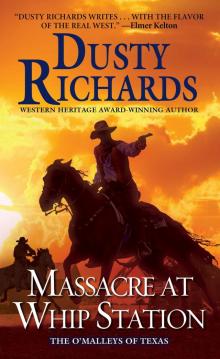 Massacre at Whip Station
Massacre at Whip Station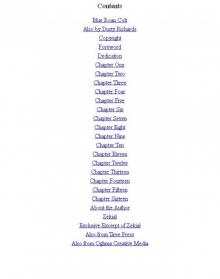 Blue Roan Colt
Blue Roan Colt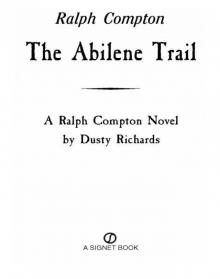 The Abilene Trail
The Abilene Trail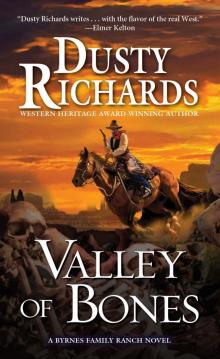 Valley of Bones
Valley of Bones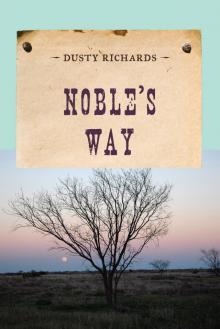 Noble's Way
Noble's Way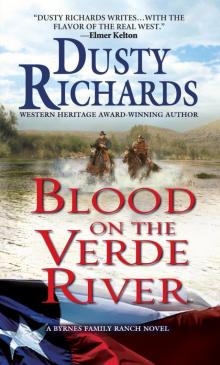 Blood on the Verde River
Blood on the Verde River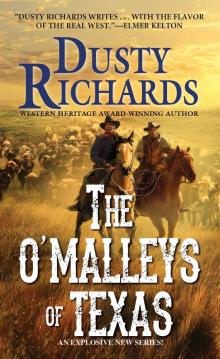 The O'Malleys of Texas
The O'Malleys of Texas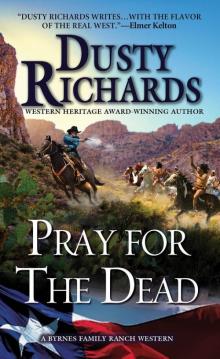 Pray for the Dead
Pray for the Dead Arizona Territory
Arizona Territory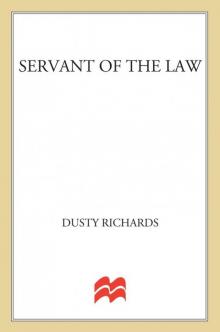 Servant of the Law
Servant of the Law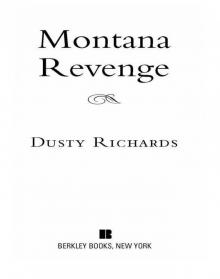 Montana Revenge
Montana Revenge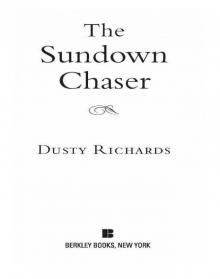 The Sundown Chaser
The Sundown Chaser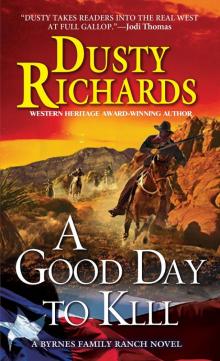 A Good Day To Kill
A Good Day To Kill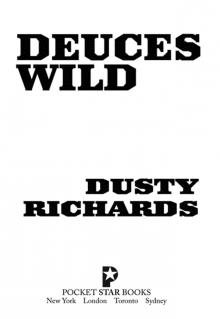 Deuces Wild
Deuces Wild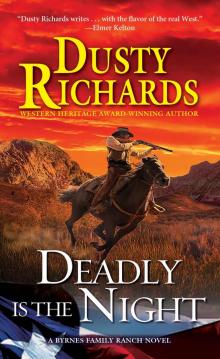 Deadly Is the Night
Deadly Is the Night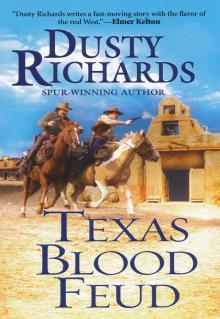 Texas Blood Feud
Texas Blood Feud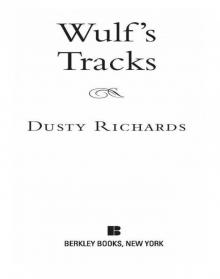 Wulf's Tracks
Wulf's Tracks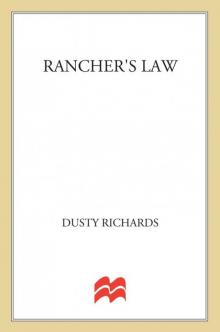 Rancher's Law
Rancher's Law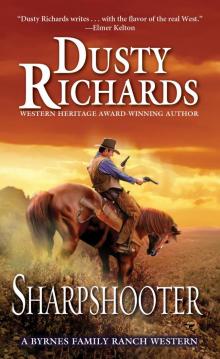 Sharpshooter
Sharpshooter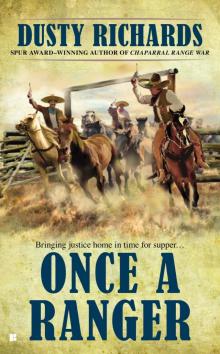 Once a Ranger
Once a Ranger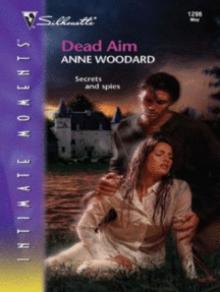 Dead Aim
Dead Aim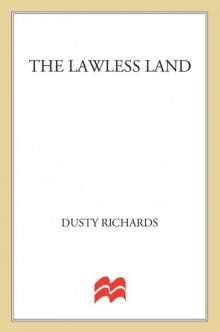 Lawless Land
Lawless Land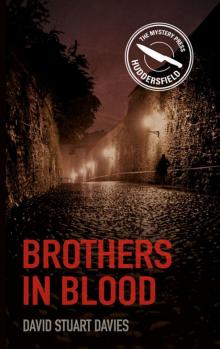 Brothers in Blood
Brothers in Blood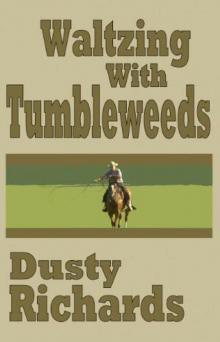 Waltzing With Tumbleweeds
Waltzing With Tumbleweeds